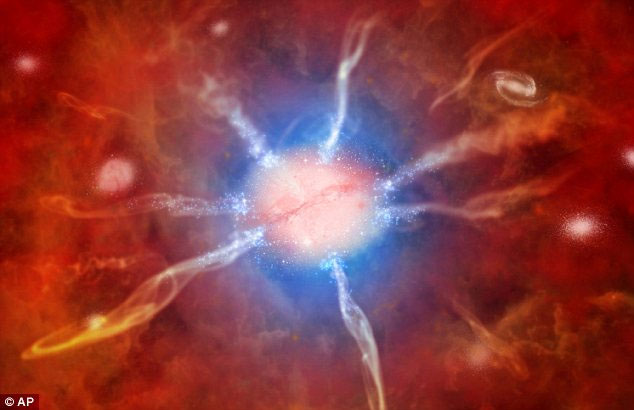Finding the galaxy 'laying' 740 stars every year
American astronomers have recently discovered a "super-perfect" galaxy, which produces about 740 new stars each year. The number of stars that this galaxy lays in a day is twice the number of stars that our Milky Way gave birth to in a year.

Illustrated images provided by NASA about the 'superhuman' galaxy .
Using NASA's Chandra X-Ray telescope, the team led by astronomer Michael McDonald, of the Massachusetts Institute of Technology, discovered the galaxy, located about 5.7 billion light-years away from them. shining. This giant galaxy is located in the center of a newly discovered cluster of galaxies and is the most fortunate galaxy of its kind.
According to astronomer Ryan Foley, who participated in the study, in other galaxies, like colliding galaxies, new stars can be produced at greater speeds. However, a galaxy in this form, with its size and age as the newly discovered galaxy does not normally produce stars at such a rapid rate.
The galaxy is currently unnamed, about three thousand billion times the size of the Sun and is at a fairly "mature" stage of about 6 billion years old.
Astronomer Megan Donahue, of the University of Michigan, commented, the findings help scientists answer the fundamental question: how galaxies form stars. According to Mr. McDonald's explanation, there is a lot of extremely hot hydrogen gas between galaxies, and when that gas drops below 0 degrees, it can form stars. However, only 10% of the gas in the universe is transformed into stars because the energy from the black holes at the center of the galaxies neutralizes the process of heat reduction.
Reference: Daily Mail
- The galaxy glows brightly when it produces 4,500 times more stars than the Milky Way
- 1.5 Gigapixel image to Andromeda galaxy with over 100 million stars
- Detecting weird ghosts only contains 0.01% stars
- Discover the farthest star in the Milky Way
- Stars are abandoned
- Found a rare 'star birth machine' in the universe
- Video: The reason some snakes give birth instead of laying eggs
- Detects 5 oversized stars on galaxies
- The central image of the galaxy through the Hubble lens
- Strange 12-year-old boy a week ... laid out 7 eggs?
- Discover the galaxy 'Green Pea'
- Discover the oldest galaxy in the universe
 Van Allen's belt and evidence that the Apollo 11 mission to the Moon was myth
Van Allen's belt and evidence that the Apollo 11 mission to the Moon was myth The levels of civilization in the universe (Kardashev scale)
The levels of civilization in the universe (Kardashev scale) Today Mars, the sun and the Earth are aligned
Today Mars, the sun and the Earth are aligned The Amazon owner announced a secret plan to build a space base for thousands of people
The Amazon owner announced a secret plan to build a space base for thousands of people